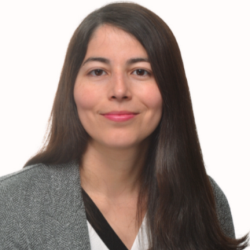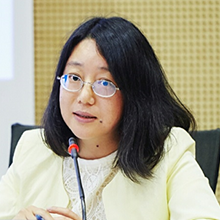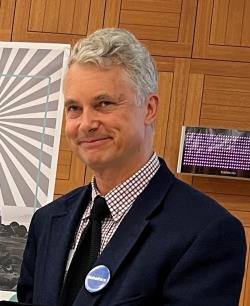Towards a human-centric approach to connectivity that leaves no one behind
UNESCO Information For All Programme, International Federation of Library Associations and Institutions, IT for Change, Global System for Mobile Communications Association
Session 176
Global life-enhancing practices for meaningful connectivity that prioritize the underserved
Connectivity has become the source of progress on earth. With progress comes the responsibility of ensuring that the advantages of technologies including new and emerging are beneficial to users and are shared equally. While the Internet has promising features that have served humanity in many positive ways, the impact of its vast potential, may also have unintended consequences for our societies.
As a result, today's internet governance dialogues and practices increasingly recognize the importance of people-centered approaches to tackling persistent digital divides. In view of that, this session will delve into the importance of addressing the pressing issue of meaningful connectivity from a human-centered perspective that allows for development while prioritizing the needs of the most vulnerable. It will also highlight the experiences of digitally underserved individuals and communities in different contexts to reveal the scope of the challenges they face and will offer a multi level perspective on how to tackle these issues.
The session will draw from the UNESCO's Information For All Programme (IFAP) experience in promoting and guiding equitable access to information and knowledge, IT for Change's interdisciplinary research on digital justice and GSMA's digital inclusion initiatives targeting the underserved. Additionally, we will de dedicate some time to discuss how to partner and mobilize the global library infrastructure for meaningful connectivity considering that at least 73% of the world's libraries are located in low-income or transitioning economies and are anchor institutions and connectivity points for their communities.
We will also discuss the impact of related outputs such as the UNESCO Guidelines for the Governance of Digital Platforms, GIS Watch/IT for Change WSIS+20 edition report and IFLA’s upcoming Internet Manifesto.

Maria is the Policy & Research Officer for Digital Affairs at IFLA where she leads on themes at the intersection of digital rights, digital inclusion, freedom of access to information and internet governance. She also coordinates joint projects on Media and Information Literacy (MIL) in collaboration with other organizations. Her previous working experiences include the public, international and non profit sectors. She holds a Master's of science in Public Policy & Human Development from the United Nations University UNU-MERIT and Maastricht University and is part of the Internet Governance Forum's Policy Network on Meaningful Access and Dynamic Coalition on Public Access in Libraries. She is passionate about themes and initiatives that strive to help the underserved and vulnerable communities.

Dr. Xianhong Hu is UNESCO's Programme Specialist at the Sector of Communication and Information since 2006. She serves on the Secretariat of UNESCO’s Intergovernmental Program of Information for All (IFAP) and leads UNESCO project of Internet Universality R.O.A.M principles (Rights, Openness, Accessibility, Multi-stakeholder) indicators.
Her expertise and responsibilities are in the areas of freedom of expression, access to information, privacy, journalism, media development, Internet governance, digital transformation and AI governance. She has followed the UN led processes of the World Summit of the Information Society (WSIS) and Internet Governance Forum (IGF). Her policy work relates to apply ROAM principles to govern the Artificial Intelligence and other emerging technologies, through her recent co-authored UNESCO study Steering AI and Advanced ICTs for Knowledge Societies: A ROAM Perspective.

Melle Tiel Groenestege is Senior Director Digital Inclusion at the GSMA, the organisation representing the interests of mobile operators and the broader ecosystem worldwide. At GSMA’s Digital Inclusion programmes, he leads work on public policy, research as well as private sector partnerships that help address the digital divide in low- and middle-income countries.
Prior to joining the GSMA, Melle was responsible for Government Relations at the headquarters of VEON, one of the largest telecommunication providers active in emerging markets. Before joining VEON, Melle worked at the International Telecommunications Union on corporate strategy, focusing on the role of digital technologies in advancing the UN Sustainable Development Agenda.

PhD in Philosophy from University of Geneva, Ignace is Managing Editor for Globethics in Geneva. Globethics is a worldwide ethics network of people based in Geneva, with an international Board of Foundation and with ECOSOC status with the United Nations. With one of the largest online ethics library worldwide, specialized in ethics Globethics is focusing on ethics, emerging technologies and education, in various ways through its online Academy and open educational resources. As Editor for Globethics Publications, Ignace is organizing editing, production and release of scholarly works in theology, philosophy and applied ethics. Ignace is also the Managing Editor of the Journal of Ethics in Higher Education. As publishing house, Globethics is committed to making books of high quality accessible to a wide audience across many Series, and over 320 books accessible for free online.

Maja Maricevic is Director of Science and Innovation at the British Library. Maja is particularly interested in the big challenges of our time, such as the continuing digital transformation and climate change. She is responsible for developing the British Library’s AI Strategy. Maja led the British Library team, delivering Living with Machines, a collaborative AI research programme between the British Library and the Alan Turing Institute, bringing together historians, data scientists, geographers, computational linguists, and curators to examine industrial revolution through research deploying AI and data-led research methods on large scale historic collections. Maja is a Board member of Knowledge Quarter, a knowledge cluster of organisations based around King’s Cross in London. She is a Chair of the Green Libraries Campaign and an Advisory Board Member for the UK Research and Innovation programme Building a Greener Future. She has previously worked in universities, government departments and as a professional consultant for PricewaterhouseCoopers.
-
 C2. Information and communication infrastructure
C2. Information and communication infrastructure
-
 C3. Access to information and knowledge
C3. Access to information and knowledge
-
 C4. Capacity building
C4. Capacity building
-
 C5. Building confidence and security in use of ICTs
C5. Building confidence and security in use of ICTs
-
 C6. Enabling environment
C6. Enabling environment
-
 C7. ICT applications: benefits in all aspects of life — E-learning
C7. ICT applications: benefits in all aspects of life — E-learning
-
 C8. Cultural diversity and identity, linguistic diversity and local content
C8. Cultural diversity and identity, linguistic diversity and local content
-
 C10. Ethical dimensions of the Information Society
C10. Ethical dimensions of the Information Society
The subject matter intersects with the above indicated WSIS Action lines. We consider that the outcomes of these exchanges and discussions may significantly contribute to the WSIS+20 review process by producing case studies exchange, policy recommendations or documents to be disseminated among WSIS stakeholders, Member States, international organizations, civil society and the private sector.
-
 Goal 4: Ensure inclusive and equitable quality education and promote lifelong learning opportunities for all
Goal 4: Ensure inclusive and equitable quality education and promote lifelong learning opportunities for all
-
 Goal 5: Achieve gender equality and empower all women and girls
Goal 5: Achieve gender equality and empower all women and girls
-
 Goal 8: Promote inclusive and sustainable economic growth, employment and decent work for all
Goal 8: Promote inclusive and sustainable economic growth, employment and decent work for all
-
 Goal 10: Reduce inequality within and among countries
Goal 10: Reduce inequality within and among countries
-
 Goal 16: Promote just, peaceful and inclusive societies
Goal 16: Promote just, peaceful and inclusive societies
-
 Goal 17: Revitalize the global partnership for sustainable development
Goal 17: Revitalize the global partnership for sustainable development
Meaningful connectivity and inclusive access to information is crucial to promote just, peaceful and inclusive societies with reduced inequalities and that ensure equitable access to education for all.